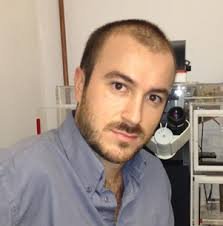What are the aims of the project?
The aim of this project is to refine 3D mini-muscle models of laminopathies and use them to test potential genome editing therapies.
Why is this research important?
Testing how safe and effective treatments are in mouse models is an important step before clinical trials in humans, but mice may not respond to a treatment in the same way as humans. Therefore, a model of human muscle that can be used by researchers in the laboratory is a valuable tool to identify and develop potential treatments for laminopathies.
What will the researchers do?
Dr Tedesco and his team are experts in growing 3D mini-muscles in the laboratory. They take skin cells from patients and turn them into induced pluripotent stem cells (iPSCs), which are then grown into tiny muscles with their own nerves and blood vessels.
The researchers have already developed human mini-muscle models for laminopathies and other muscle-wasting conditions. In this new project, they will refine their laminopathy mini-muscle models to make them more like real muscle.
The researchers will also design genome editing tools that aim to correct mutations causing laminopathies. They will test these tools in the mini-muscle models and see whether they correct the faulty nuclear structure that is characteristic of laminopathy.
Finally, Dr Tedesco and his team will assess the function of the mini-muscle models by transplanting them into mice. They will then test the genome editing tools in these mice and see what effect they have on the transplanted mini-muscles.
How will the outcomes of this research benefit people with laminopathies?
Successful completion of this project will generate potential genome editing therapies targeting a variety of mutations causing laminopathies. The project will also produce new knowledge about the differences between mini-muscles originating from people with laminopathy and those originating from healthy donors.
How might this research impact on other muscle-wasting conditions?
In the future, the knowledge gained from this project could also be used to develop mini-muscle models and genome editing therapies for other muscle-wasting conditions.
For further information
If you would like further details about this research project, please contact the MDUK Research Line on 02078034813 or email research@musculardystrophyuk.org
It is only through your contributions that we can continue to fund the vital work that takes us closer to finding treatments and cures for muscle-wasting conditions. Donate now and help change the lives of thousands of people living with these conditions. Thank you for your support.

